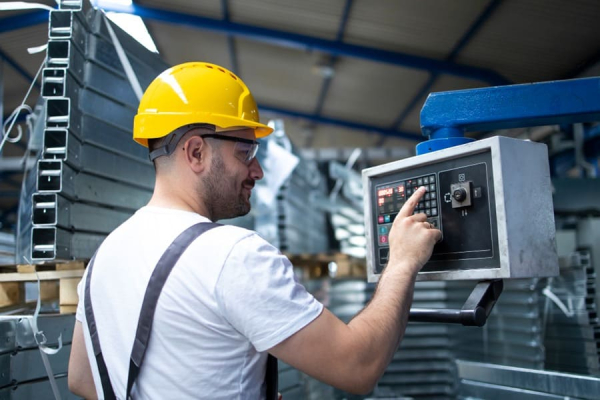Understanding CNC Machines and Their Capabilities
At the heart of modern manufacturing, you'll find CNC machines—the miraculous confluence of advanced CNC technology and the ever-growing need for precision CNC manufacturing. These robust machines, which represent the pinnacle of CNC machining, enable fabricators and artisans alike to sculpt, mill, and shape materials with an accuracy once thought impossible. To grasp the full scope of what these machines provide, let's delve into how they operate and explore their diverse capabilities.
CNC machining stands as a testament to how far manufacturing has advanced, demonstrating that intricate and complex designs can be replicated consistently and swiftly. By automating control via computerized systems, CNC machines execute series of precise movements, which convert digital designs into physical parts with minimal human intervention. The advanced CNC technology https://www.megaplot.com/ not only increases the speed of production but also enhances the level of detail achievable in every project.
- The versatility afforded by these machines means that products and components across aerospace, automotive, medical, and more sectors benefit immensely.
- From shaping aerospace components with exact tolerances to carving intricate features on medical implants, precision CNC manufacturing is indeed shaping the future.
Underlying these feats is a combination of hardware and software working in unison: high-speed motors, precision spindles, and cutting tools integrated with sophisticated programming to direct these elements with deft precision. Now, let's look at a table that lays out the primary capabilities of a typical CNC machine to help you appreciate their role in today's manufacturing landscape:
Capability | Description | Industry Application |
Milling | Automated cutting and drilling of materials | Aerospace, Automotive, Energy |
Turning | Precision shaping of parts using a rotating mechanism | Machine Tool, Fabrication, Defense |
Drilling | Creating round holes in materials with precise depth and diameter | Construction, Electronics, Medical Devices |
Grinding | Finishing surfaces to high tolerances and surface qualities | Metalworking, Material Manufacturing |
By understanding the rich capabilities of CNC machines, you are better equipped to translate your visionary designs into tangible, precision-crafted products. As the realm of advanced CNC technology continues to expand, so too does the potential to push the boundaries of what can be achieved within precision CNC manufacturing.
Benefits of Using High-End CNC Equipment
As you delve into the realm of precision CNC manufacturing, it's apparent that your equipment choices play pivotal roles in determining the output quality and overall efficiency of your operations. Investing in high-end CNC equipment not only brings state-of-the-art advanced CNC technology to your fingertips but also offers tangible benefits that could significantly improve your competitive edge. Let's discuss how these sophisticated machines can transform your manufacturing enterprise.
- Increase in Production Speed: With high-end CNC equipment, your operations become swifter, thanks to automated processes that reduce cycle times. High-speed machining capabilities allow for rapid production without sacrificing quality.
- Exceptional Precision and Accuracy: The hallmark of precision CNC manufacturing is its ability to produce parts with exacting tolerances. Advanced equipment ensures each component meets rigorous specifications, enhancing product reliability.
- Enhanced Capability for Complex Designs: As designs become more intricate, the flexibility and sophistication of your CNC technology need to match up. High-end machines have the precision to handle detailed and complex geometries that lower-grade models cannot.
- Improved Surface Finishes: The quality of surface finish with these machines often surpasses traditional methods, reducing the need for additional finishing operations. This not only saves time but also material costs.
The advanced CNC technology inherent in these systems is not just about doing the same work faster; it's about expanding the possibilities of what can be created. The below table contrasts some fundamental differentiators between high-end and standard equipment:
Feature | High-End CNC Equipment | Standard CNC Equipment |
Precision Level | Sub-micron tolerance | Standard tolerance levels |
Materials Processable | Diverse range, including exotic alloys | Limited to common metals and plastics |
Automation | Highly automated with less human intervention | Requires more manual operations |
Software Integration | State-of-the-art software, IoT ready | Basic software capabilities |
Future Proofing | Equipped for future advancements in manufacturing | May quickly become dated with evolving technologies |
With high-end CNC equipment, productivity and innovation are not just improved; they're redefined. Although initial investments may be higher, the long-term benefits of incorporating such advanced machines into your shop floor can be pivotal to staying ahead in a competitive industry. After all, quality, reliability, and agility in manufacturing are now prerequisites for success in complex markets.
The Evolution of CNC Technology
In your journey through the world of modern manufacturing, you've come to recognize that CNC machines are the epitome of technological advancement. The story of CNC technology is one of relentless progress, a saga that has witnessed a transformation from rudimentary automated tools to sophisticated systems imbued with advanced CNC technology.
The seed of CNC machining was planted with the advent of numerical control, which sparked a series of innovations leading to the automation of machine tool operations. As the digital age dawned, CNC machines evolved rapidly, boasting features like increased memory for storing complex programs, easy-to-use interfaces, and enhanced precision in cutting and shaping materials.
- User-Friendly Software: The rise of user-friendly software catapulted CNC machining into mainstream manufacturing, enabling operators with minimal programming expertise to craft intricate designs.
- Precision Engineering: With each iteration, CNC machines have achieved tighter tolerances, ensuring that components are produced with consistently high accuracy, a feature particularly important for aerospace, automotive, and medical industries.
- Material Versatility: Today, these machines effortlessly cut through a diverse array of materials, extending their utility beyond metals to plastics, wood, and composites, thus expanding the horizons for product design and creativity.
- Complex Operations: The capacity to perform complex operations with a single set of instructions has minimized the need for manual intervention, streamlining manufacturing processes.
- Smart Technologies: The integration of smart technologies such as AI and IoT has ushered in an era of predictive maintenance and real-time monitoring, further enhancing the reliability of CNC systems.
As you gaze upon the horizon of advanced manufacturing, it's clear that the role of CNC machinery is central to the narrative. The evolution of these machines is not just about the technology itself but how it empowers you to push the boundaries of what's possible in manufacturing. The journey of CNC technology is ongoing, and with each breakthrough, your ability to produce more intricate, precise, and efficient outcomes grows ever stronger.
How to Select the Best CNC Machines for Your Workshop
When you're looking to elevate your CNC machine shop, selecting the best CNC machines is a crucial step. As you embark on this journey, there are key factors you should consider to ensure you acquire CNC machining tools that align perfectly with your business goals and production requirements. We'll help you navigate these considerations for making an informed purchase.
- Machine Size: The physical space of your workshop directly influences the size of the CNC machine you can accommodate. Measure your available space and keep in mind that larger projects may require bigger machines.
- Power Requirements: Match the machine's power capabilities with the materials and the complexity of jobs you plan to undertake. Higher power often equates to handling tougher materials and more demanding tasks.
- Sophistication Levels: Depending on the nature of your projects, you might require CNC machines with advanced features. Analyze if your jobs necessitate such complexities, or if simpler models would suffice.
- Operational Compatibility: Ensure the new machinery will seamlessly integrate with any existing systems in your workshop, including software and hardware components.
- Project Nature: Consider the types of work you typically handle. Do your projects require ultra-precision, or are they more focused on volume? Different machines excel at different tasks.
Remember, investing in CNC machining tools is a decision that should align with both current and future needs of your business, forecasting the scalability and adaptability of the best CNC machines. Weighing these factors carefully will help you form the backbone of a highly efficient, responsive, and successful CNC machine shop.
Finding the Right CNC Machine Shop for Your Needs
When embarking on your search to partner with a CNC machine shop, your mission is to find one capable of meeting the demands of your projects with expertise and reliability. It is crucial that the shop not only houses advanced CNC technology but also possesses a team of knowledgeable professionals who understand the nuances of CNC machining. As you navigate this process, consider the following factors that can guide your decision to a fruitful partnership.
- Range of Capabilities: Ensure the shop's services are diverse enough to handle all aspects of your projects.
- Advanced Equipment: The presence of advanced CNC technology signals a commitment to quality and precision.
- Expertise: Skilled machinists and engineers are essential for high-quality craftsmanship and problem-solving.
- Quality Control: Robust quality assurance processes are the backbone of consistent, precise outputs.
- Customer Service: Consider how well the shop communicates, meets deadlines, and handles any issues that arise.
- Reputation: Look for reviews or testimonials from other clients to gauge the reliability of the CNC machine shop.
To help you evaluate potential CNC machine shops more clearly, below is a comparative table detailing key aspects to consider:
Factor | Why It's Important | What to Look For |
Technology | State-of-the-art machines produce higher precision parts and more complex geometries. | Shops using industry-leading CNC machining platforms and software. |
Experience | Years in business often correlates with the level of expertise and quality of work. | Long-standing shops with a track record of successful projects in your industry. |
Capacity | The ability to scale up operations to meet larger order demands without sacrificing quality. | Shops that can showcase scalability and handle fluctuating project sizes. |
Industry Specialization | Certain projects require specific industry knowledge for optimal outcomes. | Shops that specialize or have extensive experience in your sector. |
Certifications | Certifications can be an indicator of a shop’s commitment to standards and continuous improvement. | Certified CNC machine shop in quality management systems such as ISO 9001. |
Turnaround Time | Efficiency in production without compromising quality is key to meeting project timelines. | Shops with a proven record of meeting deadlines while maintaining high-quality output. |
Cost | Finding a balance between affordable services and high quality work is crucial for ROI. | Competitive pricing without hidden fees, providing value for their services. |
Your diligence in this selection process is more than just finding a capable CNC machine shop; it's about building a partnership that will enhance your projects and ensure their success for years to come. With advanced suiting your needs—be they in aerospace, medical, automotive, or consumer electronics—you can place trust in a chosen partner to turn concepts into tangible, high-quality components.
Top CNC Machining Tools for Advanced Manufacturing
As you delve into the world of advanced manufacturing, it's paramount to understand that your production capabilities hinge significantly on the types of CNC machines you employ. Leveraging top CNC machining tools ensures that your manufacturing processes stay ahead of the curve, integrating advanced CNC technology for both enhanced productivity and precision.
Let's consider the main types of CNC equipment crucial for various manufacturing needs:
- 3-Axis CNC Mills – Ideal for straightforward geometries and can handle basic drilling, milling, and lathing operations.
- 5-Axis CNC Mills – Provides greater flexibility with the ability to machine complex shapes in a single setup, imperative for high precision manufacturing tasks.
- CNC Lathes – Specializes in creating detailed cylindrical parts with superior finish quality and dimensional accuracy.
- CNC EDM (Electrical Discharge Machining) – Uses electrical sparks to mold materials into desired shapes, especially for extremely hard materials.
- CNC Plasma Cutters – Incorporates plasma technology for cutting through heavy materials at high speeds without compromising on accuracy.
Each type of CNC machine brings its unique advantages and is adept at handling certain materials and geometries. Here's a table comparing the primary functions and suitability of these top CNC machining tools:
Machine Type | Main Functions | Material Suitability | Production Volume | Complexity of Parts |
3-Axis CNC Mills | Drilling, Milling, Lathing | Metal, Plastic, Wood | Low to Medium | Simple to Moderate |
5-Axis CNC Mills | Complex Milling, Drilling at angles | Metal, Advanced Alloys | Medium to High | Complex |
CNC Lathes | Turning, Boring | Metal, Thermoplastics | High | Moderate |
CNC EDM | Molding, Cutting | Titanium, Hardened Steel | Varied | High |
CNC Plasma Cutters | Cutting through thick material | Steel, Aluminum, Brass | High | Simple |
Depending on your specific production needs, costs, and desired outcomes, one or a combination of these CNC machines will prove essential. Their inclusion in your manufacturing setup will directly influence the quality, turnaround time, and consistency of your finished product.
Cost Considerations - High-End vs Affordable CNC Machines
Delving into the world of CNC machinery, you'll quickly discover that the cost of CNC machines fluctuates significantly based on multiple factors. A common quandary you may face is choosing between affordable CNC machines and high-end CNC equipment. It's essential to compare the upfront investment against the long-term value each machine type provides. Let's dissect some critical cost considerations that arise during the decision-making process for CNC equipment acquisition.
- Technology Complexity: High-end models typically feature the latest advancements, including higher precision and automation levels.
- Production Volume: Assess whether your production volume justifies the elevated cost of high-end equipment or if more affordable CNC machines can meet your needs.
- Material and Size Capacity: Larger machines with the capability to handle diverse materials tend to have a higher price tag.
- Brand and Support: Established brands might offer a higher level of support and reliability but can come at a premium.
- Durability and Lifespan: Consider the machine's build quality and expected lifespan, as a cheaper upfront cost could lead to increased costs over time.
- Software and Updates: The software provided with high-end CNC equipment is often more robust, featuring regular updates and better integration.
To better understand the financial implications of choosing between varying tiers of CNC machinery, consider this comparative table illustrating the differences in features and potential costs:
Feature | Affordable CNC Machines | High-End CNC Equipment |
Precision Capabilities | Standard precision suitable for most tasks | High precision, capable of intricate designs |
Production Speed | Consistent for small to medium batches | Optimized for high speed in large-scale production |
Operating Software | Basic software with necessary functionalities | Advanced software with frequent updates and higher compatibility |
Material Handling | Limited to standard materials and sizes | Handles a wide range of materials and sizes |
Machine Longevity | Good with proper maintenance | Excellent, with potential for longer service life |
Support and Warranty | Basic support; may involve additional costs for extended service | Comprehensive support with an extensive warranty period |
Choosing between affordable CNC machines and high-end CNC equipment will ultimately hinge on your specific production requirements and budget. By carefully evaluating the cost implications and the balance between initial investments and the expected value, you can make an informed decision that aligns with your long-term manufacturing objectives.
Integrating Advanced CNC Technology into Your Operations
As you consider elevating your production capabilities, integrating advanced CNC technology is a decisive step towards enhancing your competitive edge. This technology not only refines precision CNC manufacturing but also redefines efficiency and quality. To facilitate a seamless transition into advanced operations with CNC machines, certain strategic measures should be undertaken.
- Assessment of Current Infrastructure: Conduct a thorough analysis of your existing setup to determine the compatibility and upgrades required for the new CNC technology.
- Staff Training Programs: Invest in comprehensive training for your team to ensure they are adept at operating new CNC machinery and software.
- Workflow Revision: Adapt your manufacturing processes to incorporate the capabilities of advanced CNC technology for optimal results.
- Hardware and Software Integration: Verify that both the hardware and software components of your CNC machines are perfectly synchronized to maximize efficiency and precision.
- Quality Control Protocols: Establish rigorous quality control protocols to maintain the highest standards of manufacturing made possible by advanced CNC technology.
Remember, the journey to embedding advanced CNC technology within your operational framework is continuous. It demands regular evaluation and adaptation to harness the full potential of your CNC machines. As you progress, you'll discover that these efforts not only improve the output but also empower your team with the skillset required for future manufacturing challenges.
Ensuring Precision with CNC Machines
In the realm of CNC machinery, precision is not just a goal; it's a prerequisite. Your ability to maintain the utmost accuracy with your CNC machines determines the quality and consistency of your final products. It's critical to select top CNC machining tools that cater to the exacting demands of your projects, but that's just the starting point. A sustained commitment to precision involves regular calibration checks, which serve to rectify even the slightest deviation from desired measurements. By adhering to a rigorous calibration schedule, you ensure that your equipment remains a reliable asset in precision CNC manufacturing.
But achieving and maintaining this high level of precision extends beyond just the mechanical realm. The upkeep of your CNC machines is equally consequential. Regular servicing is not just prudence; it's an investment in the longevity and performance of your equipment. Think of these routine maintenance tasks as essential tune-ups that keep your machines operating like well-oiled pistons in the greater engine of your production line. Whether it's replacing worn components or updating software settings, staying proactive about maintenance helps in significantly reducing down-time and avoiding costly errors.
Moreover, let's not overlook the role of technology in ensuring precision. Sophisticated software solutions can monitor and analyze performance, offering you real-time insights into the accuracy of your CNC machining processes. By embracing such technological aids, you’re able to detect potential issues before they escalate and make data-driven decisions to refine operations. Ultimately, your attention to both the hardware and software aspects of your CNC machines culminates in a streamlined, precise, and efficient manufacturing environment that stands up to the demands of today's competitive marketplace.








































